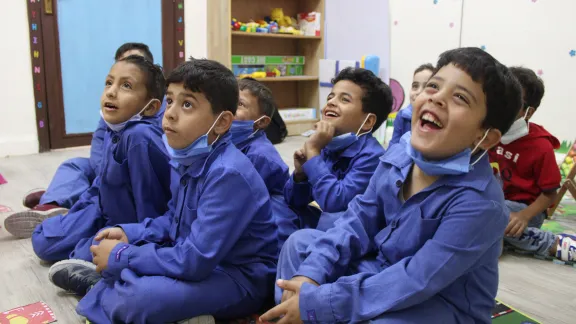
Students enjoy the multi-purpose-room at Othman Bin Affan Primary School for Boys in Zarqa. Photos: LWF/ A. Alsamra
LWF concludes education project which supports schools and communities
(LWI) - Teacher trainings, school improvement projects, school kits, vocational training and counselling for out-of-school youth - thousands of Syrian and Iraqi refugee students, as well as Jordanian children and youth have benefitted from a Lutheran World Federation (LWF) project supported by the German development agency Bread for the World, which came to a conclusion earlier this year.
The project addressed an emergency resulting from the protracted refugee crisis in Jordan. The country has taken in about 1.6 million refugees from Iraq and Syria. While for out of ten Syrian children are not enrolled in school, the remaining 60 percent who have enrolled are primarily in Jordanian schools, which now often teach in two shifts to accommodate the high number of pupils.
This put stress on teachers, children, and also on the buildings – many of which needed upgrading before the crisis. In this situation, many children are not able to learn, and some may eventually be taken out of school by their families be married early, or to work.

Children draw in the multi-purpose room. Teachers notes that they have become more careful and disciplined than before.
Integrated approach
The project “Improved Learning Environment for Jordanian, Syrian and Iraqi children and youth, as a contribution to Social Cohesion” addressed the situation on three different levels. Over a period of four years, LWF worked closely with the Ministry of Education in Jordan to train over 600 teachers from 100 schools in new participatory methods and non-violent communication. Through concrete school improvement projects, which combine renovations and new education approaches, LWF worked with school directors, teachers, pupils and parents to increase the engagement and sense of ownership for the children’s education.
“The project is addressing the problem of a “lost generation” of refugees, which in turn increases the risk for extremism or violence,” says Ala Ahmad Khaleel, LWF Program Coordinator in Jordan.
Four years later, change is visible in the targeted schools and communities. Othman Bin Affan Primary School for Boys in Zarqa is one of a 100 schools that participated in the project. After six of its teachers completed the training, the school received a grant to realize their improvement idea: a multi-purpose room, equipped with creative, artistic, and technical tools: Playdough, Lego blocks, crayons, musical instruments and a handmade puppet theatre, recycled from an old cardboard box.

Boys play a game. The multi-purpose room has also become an incentive, and motivation for the children to come to school and learn.
"Like a magic wand”
“All the children in this neighborhood are poor,” explains Mrs. Ghada, the principal of the school. “They do not have money for activities, they can barely afford clothes and food. There are no games, no recreational spaces and no security to play outside. As these children do not find an outlet for their energy, it can easily turn into aggression. It does not help that we are situated in a neighborhood with many other problems, such as bullying, racism, domestic violence, discrimination, and drug abuse.”
Before the LWF intervention, many teachers expressed frustration. One of the teachers, Amaal, who has been teaching at the school for two years, says: “At some point, I totally lost hope for the kids. Every time I tried, I failed to change their mindsets; they are not used to love and kindness. For them, communication is similar to fighting, everything is a competition, a battle.”
At some point, I totally lost hope for the kids. Every time I tried, I failed to change their mindsets; they are not used to love and kindness. For them, communication is similar to fighting, everything is a competition, a battle.
Initially, Amaal was also not sure if the LWF training in participatory methods and non-violent communication would change anything. The multi-purpose room however visibly complemented the new approach, and became a catalyst for change. The students helped paint and decorate, they kept it tidy, and treated the toys and tools with care.
“This room helped me control my classroom more than anyone can imagine,” Amaal says. “It was like a magic wand, creating something real and tangible to help these kids psychologically, pedagogically and emotionally. The pupils are well behaved, polite, quiet and excited to come to school. This room is the only creative and fun space in their lives.”

A boy with a toy traffic light. As many children come from difficult family backgrounds, the project also included non-violent communication into their trainings.
Sustainable approach
The example is spreading. Other schools have shown interest in non-violence trainings and have linked up to the teachers trained through the LWF project. Activities are being developed to enable the schools to keep the rooms clean and buy additional material once the initial investment is exhausted. There is evidence that the targeted schools have become agents of change in the communities, fostering social cohesion between refugees and Jordanian hosts.
It is now up to teachers and students to continue the work they started with LWF’s help. “The joint participation of students and staff led to a renewed sense of energy and pride, which seems infectious within and beyond the school. Younger pupils look at the older as role models,” LWF Program Coordinator Khaleel notes.
Since 2012, LWF supports Syrian and Iraqi refugees and vulnerable Jordanians in Jordan. LWF is present in local communities and in the Zaatari camp. In 2019, the LWF Jordan country program supported more than 45,000 individuals through protection and social cohesion, livelihoods, and quality services, primarily in education.


